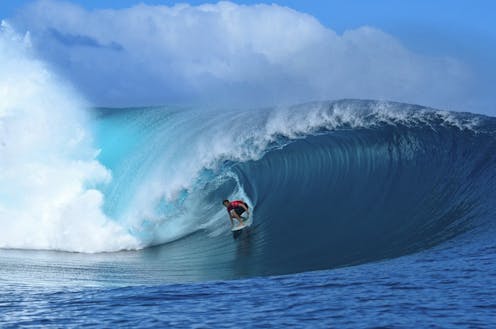The greenest games ever? How claims of Olympic sustainability hit a reef in Tahiti
- Written by Belinda Wheaton, Professor, School of Sport, Health and Human Performance, University of Waikato

A greener games? Certainly that is what Paris promised when it made environmental sustainability, innovation and leadership central to its successful bid to host the 2024 Olympic and Paralympic Games.
The Organising Committee promised[1] “historic” progress on climate goals, halving the carbon footprint[2] of previous games in Rio and London.
To achieve this, Paris will cut carbon emissions across travel, construction and operations such as catering and accommodation. All Olympic sites will connect to the public electricity grid, avoiding diesel electricity generation.
To enhance social, economic and environmental sustainability, new construction has been minimised by using existing and temporary venues.
All laudable objectives that align with the International Olympic Committee (IOC) goal of using the games to “inspire sustainable futures around the world”. Despite the bold claims, however, the way Paris has delivered its surfing event in Tahiti illustrates just how challenging it is to turn rhetoric into reality.
Olympic surfing on a Pacific atoll
Surfing debuted at the Tokyo Olympics in 2020-21. But an international surfing event is challenging to organise and run, and few cities can guarantee quality waves and ideal weather conditions for the duration.
While the Tokyo surfing ran smoothly, the wave quality on the Japanese east coast was not ideal for high-performance competition.
Initial reports suggested Paris was building an artificial wave pool. But such an energy intensive and costly facility would have been difficult to align with the host’s sustainability goals.
France’s Atlantic coast then became the favoured venue, but was later supplanted by Teahupo’o in Tahiti, French Polynesia, almost 16,000 kilometres from Paris.
While the IOC has been committed to a “one host city” model, recent policy changes in its Agenda 2020+5[3] allow for increased flexibility. Hosting the Olympics can now involve several cities and even regions or countries.
And it’s not hard to see why Teahupo’o became the preferred option. One of the world’s most challenging and dramatic surf breaks, it is already part of the pro surfing world circuit (although until recently it was deemed too dangerous for women, who were excluded from 2006 till 2022).
In 2024 it will showcase the spectacular, athletic nature of modern surfing against a stunning Polynesian island backdrop. Holding the event in Tahiti, it was claimed[4], would “bring a sense of belonging to overseas French territories”.
In the end, however, the choice of surfing venue has proved highly controversial, causing local and international protest.
Local versus global
Teahupo’o is a small settlement on the main island of Tahiti’s southwestern coast. Locals first became alarmed when leaked plans for an Olympic village revealed vast new infrastructure.
This included two-lane roads, a car bridge, electricity groundwork, coastal embankments, a floating pontoon for spectators and scaffolding for 200 officials.
Residents and environmental groups quickly responded, raising media attention and demanding greater transparency and public participation. As Teahupo’o mayor Roniu Poaru stated[5]:
Our population accepts the Olympic Games, but that comes with conditions […] the goal is to preserve our environment.
Compromises were eventually reached. New infrastructure would be kept to a minimum, with competitors living on a cruise ship. Olympic staff, press and officials would be housed with residents or in local guesthouses.
With limited capacity for live spectators, viewing screens will be set up in the local town and in the capital, Papeeti.
Tower of trouble
The greatest concern, however, has been over the construction of a new aluminium judging tower to replace the existing structure, which was deemed unsafe by the Olympic organisers.
This involved drilling into the delicate coral reef, which scientists say could have dire consequences for the reef ecosystems.
A global petition was launched to stop the new tower. The International Surfing Association, which is responsible for developing and running Olympic surfing, said it would not support any new construction on the reef.
Despite this, the head of the Paris organising committee and President of French Polynesia were said to be[6] “in lockstep together” and “united in their desire to see the judging tower built”. And so it was, albeit a scaled back version.
But many Tahitians remain upset at what they saw as a disrespectful process. Tahitian surfer Vahiné Fierro[7], who is representing France in the event, described the reef environment as “our temple”:
It’s a spiritual belief, living incarnation of our heritage, and our ancestral land.
Ironically, as our earlier research[8] revealed, such beliefs express the very essence of surfing’s Polynesian origins, which the IOC has been so keen to showcase through surfing’s inclusion in the Olympics.
‘Greenwashing gold’
The controversy surrounding the surfing event at the Paris Olympics highlights the many challenges in delivering sustainable mega-events.
Many scholars and activists remain unconvinced by the IOC’s environmental claims, and have questioned whether the organisation is really “greenwashing gold[9]”.
Indeed, the IOC continues to be highly selective about how it measures its operations to support various Utopian projections and environmental promises. And research evaluating Olympic sustainability[10] between 1992 and 2020 has shown it has declined over time.
According to[11] Georgina Grenon, the environmental excellence director for Paris 2024:
We want to show that another model is possible and create a legacy for major sporting events. We don’t claim to be perfect, but we want to show that we can do things differently.
Hosting the surfing event in Tahiti is certainly doing things differently. But it raises yet more questions about the IOC’s claims of leadership in environmental sustainability.
References
- ^ promised (www.france24.com)
- ^ halving the carbon footprint (olympics.com)
- ^ Agenda 2020+5 (stillmed.olympics.com)
- ^ it was claimed (olympicstudies.org)
- ^ Roniu Poaru stated (www.theguardian.com)
- ^ said to be (www.surfer.com)
- ^ Vahiné Fierro (www.surfer.com)
- ^ earlier research (www.taylorfrancis.com)
- ^ greenwashing gold (www.nature.com)
- ^ evaluating Olympic sustainability (www.nature.com)
- ^ According to (www.france24.com)

















